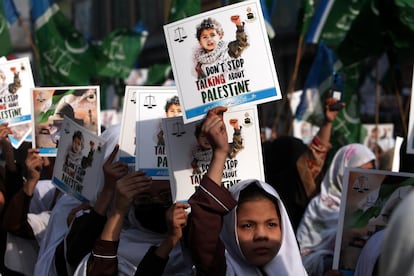Human Rights Watch accuses Meta of censoring content in support of Palestine on Instagram and Facebook
The international organization found the company restricts or eliminates posts and comments in a ‘systemic and global’ manner and requests a review of its policies


Suspended accounts, deleted comments, blocked users or posts deleted at government request. Meta is silencing Palestinian voices and those of the people who support them, “in a pattern of undue removal and suppression of protected speech” on Instagram and Facebook since October 7, when the war in Gaza began, said Human Rights Watch (HRW) in an investigation released this Thursday. The humanitarian organization criticized the social media company’s “broken promises” when it comes to moderating content with transparency and responsibility.
The research found that the censorship of content related to Palestine on Instagram and Facebook is “systemic and global.”
“What impressed us is that it is global. These are not activists who usually handle the issue of Palestine. They are ordinary citizens, people concerned with what is happening, who are reacting to the news and experiencing censorship for the first time,” said Deborah Brown, acting associate technology and human rights director at HRW and co-author of the report, in statements to this newspaper. The study reviewed 1,050 cases of online censorship from over 60 countries and “the cases are consistent with years of reporting and advocacy by Palestinian, regional, and international human rights organizations detailing Meta’s censorship of content supporting Palestinians.”
HRW argues that Meta is applying its security standards in an “inconsistent” manner, and that this leads to the erroneous removal of content about Palestine and causes many users to choose not to share certain information to avoid being blocked or flagged.
HRW sent Meta the conclusions of its investigation and the parent company of Facebook and Instagram responded that it was aware that the measures it adopts during conflicts could have unintended consequences such as inadvertently limiting harmless or even useful publications.
This newspaper contacted Meta to learn more about the measures it has taken to moderate its content in the midst of this crisis, and the company directed reporters to the blog where it explains its decisions “to keep people safe on our apps while giving everyone a voice” in the wake of October 7. This week, complaints filed by users led Meta’s Oversight Board to estimate that the company’s automated tools unnecessarily removed two videos related to the conflict between Hamas and Israel and to highlight that the use of these automated mechanisms increases the likelihood of removal.
“The Board’s decision confirms what we have seen: there are many people who have suffered this censorship who appeal for their content to be restored,” said Brown.
No Palestinian flags, no criticism of Israel
The investigation published on Thursday by HRW concludes that comments that included the slogans “Free Palestine” “Cease fire now” or “Stop genocide” were removed from numerous publications. Phrases that included a mere neutral mention of Hamas, a criticism of the Israeli government or used an emoji with the Palestinian flag also disappeared.
Meta responded to HRW, saying that any content that glorifies Hamas, considered a dangerous organization by Meta, is not allowed on its platforms. The company added that “we can make mistakes and that is why we offer the possibility for people to appeal and tell us what they think we have done wrong and we will examine it.”
The study says that “in reviewing hundreds of cases of content removal and the inability of certain users to post comments on Instagram and Facebook, Human Rights Watch found Meta’s automated moderation tools failed to accurately distinguish between peaceful and violent comments.”
Instagram and Facebook have suspended or permanently deactivated the accounts of journalists, activists and media outlets. The investigation cites the Instagram page of Let’s Talk Palestine, the account of Mondoweiss correspondent Leila Warah, and the Facebook page of the Quds News Network. The argument used in the majority of these cases was non-compliance with the “dangerous organizations and individuals” policy. According to this investigation, the policy also affects peaceful messages in favor of human rights and silences the debate on Israel and Palestine.
“Some users who reported cases to Human Rights Watch explained that their posts sought to speak out against violence, not incite it,” reads the report. “By stripping the content of context and bluntly applying its policies, Meta is effectively censoring newsworthy content and achieving the opposite outcome of the stated intention of its policies.”
Sign up for our weekly newsletter to get more English-language news coverage from EL PAÍS USA Edition
Tu suscripción se está usando en otro dispositivo
¿Quieres añadir otro usuario a tu suscripción?
Si continúas leyendo en este dispositivo, no se podrá leer en el otro.
FlechaTu suscripción se está usando en otro dispositivo y solo puedes acceder a EL PAÍS desde un dispositivo a la vez.
Si quieres compartir tu cuenta, cambia tu suscripción a la modalidad Premium, así podrás añadir otro usuario. Cada uno accederá con su propia cuenta de email, lo que os permitirá personalizar vuestra experiencia en EL PAÍS.
¿Tienes una suscripción de empresa? Accede aquí para contratar más cuentas.
En el caso de no saber quién está usando tu cuenta, te recomendamos cambiar tu contraseña aquí.
Si decides continuar compartiendo tu cuenta, este mensaje se mostrará en tu dispositivo y en el de la otra persona que está usando tu cuenta de forma indefinida, afectando a tu experiencia de lectura. Puedes consultar aquí los términos y condiciones de la suscripción digital.








































